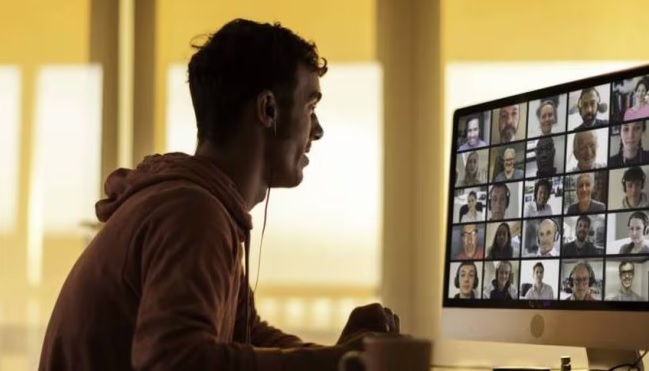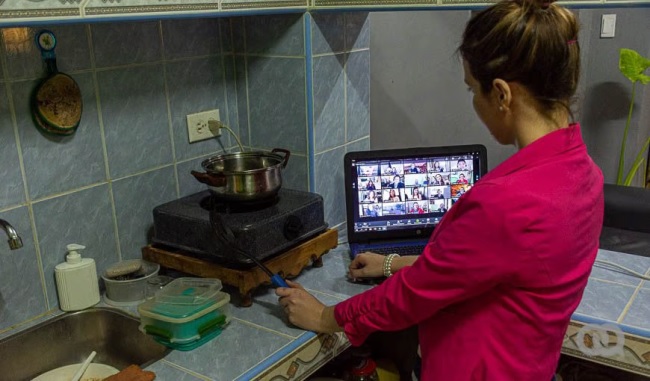
While teenagers in particular are stressed on the need to disconnect from the digital sphere for at least a few hours, workers around the world are emphasizing their right to disconnect.
It happens that employers do not always respect the personal space of the worker, and apart from their working hours or adhering to their goals or standards, they communicate with them through various digital means, invading spaces designated for the family and enjoying leisure time. . .
As a result of the Covid-19 pandemic, remote working has experienced significant growth around the world and is maintained above all in those entities that have found benefits in terms of productivity and savings; As well as the benefits it brings to employees.

Photo: Taken from Cincodias.elpais.com
In the report Working time and work-life balance around the worldintroduced by the International Labor Organization (ILO) at the beginning of this year, that organization analyzes two main aspects of working time: working hours and the organization of said working time, which also refers to telework and telework.
This report is the first to focus on the balance between professional life and personal life, and indicates that more than a third of employees in the world work more than 48 hours per week.
Limiting the number of working hours to protect workers’ health has been the focus of attention for more than a century, but efforts to balance work and private life have been gaining strength later, as policymakers have become more aware of the difficulty workers face. In reconciling personal life with paid work.
“There is a significant amount of evidence that work-life balance policies provide important benefits for businesses, supporting the argument that these types of policies are beneficial for both employers and employees,” the ILO text notes.
Photo: Sadiel Medeiros
What is known as the right to disconnect is closely intertwined with the above since the connection maintained by those assigned to remote work, remote work or hybrid work should not be understood as equivalent to permanent availability depending on the company.
Such a mismatch between personal time and work time, which is equivalent, among other things, to answering phone calls, emails or messages on social networks from bosses at any time, represents an obstacle to the necessary mental separation from work and can entail psychological risks. Increased stress.
In fact, there are already diseases such as the so-called Technical work pressures– “Nomophobia” (irrational fear of not having a mobile phone), This is not strange for Cubansand others derived from the constant and untried use of new technologies.
Image: LinkedIn
Since February last year, the World Health Organization has also… In the words of Dr. Maria Neira, he noted: Director of the Department of Environment, Climate Change and Health at the World Health Organization, said that “from the beginning of the pandemic, it has been very clear that remote work can easily provide health benefits, but it can also have a harmful effect.”
“How we achieve the balance depends entirely on governments, employers and workers working together, and on flexible and innovative occupational health services, to create policies and practices that benefit workers and workers alike. Like work.”
Separation is a relief
Legal advisor Lidia Guevara Ramírez, member of the Cuban Association for Labor and Social Security Law of the National Union of Jurists of Cuba, explains this topic in detail in her interesting article. Digital interruption. The need for protection.
By the way, the researcher on labor issues and university professor also points out that the right to digital separation aims to preserve the physical, mental and emotional health of the human being, as a worker, and provide the necessary space for him to rest, in order to create a balanced balance between your personal and work life.
“It is a right that is in direct conflict with an abusive practice that has already become common in many organizations (…).” It is simply a matter of respecting rest times and daily and weekly vacations, which must be included in the employment contract,” the expert emphasizes and adds that the current equivalent of the right to rest is the right to disconnect digitally due to the increasingly widespread presence of remote work in its various forms.
In the case of Cuba, in 2021 the Ministry of Labor and Social Security approved Resolution No. (71) regarding establishing regulations for remote work and remote work. It is specified in Article 10 (Subsection G).
The conditions for delivering the work result should be organized, so that the planned tasks do not hinder the worker’s rest time.
Our country is moving towards the computerization of society, so remote work and similar variants are not a temporary thing left behind by the terrible pandemic. For this reason, and because the matter is still new, there is a demand for research and studies that contribute, in the words of Guevara Ramírez, to “a safe work environment, whether in terms of their mental, physical, or psychological health.” Psychosocial well-being and not freedom from disease.” In this, the right to disconnect will always have a relevant space.

“Award-winning alcohol trailblazer. Hipster-friendly internetaholic. Twitter ninja. Infuriatingly humble beer lover. Pop culture nerd.”


